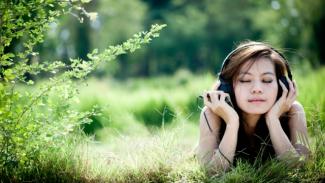
Instructions
Do the preparation task first to help you with the difficult vocabulary. Then read the article and do the exercises to check your understanding.
You know that thrill you get when listening to your favourite music? That exciting feeling down your spine when you hear your favourite melody or rhythm? According to a recent study, it seems the same thing can happen while you are reading, but not with every kind of text. This opens up fascinating questions around how music, reading and emotions are connected in the brain.
The study
‘We decided we would do a comparison between four or five different kinds of texts to see how the brain responded,’ explains Professor Adam Zeman, a neurologist. ‘The participants lay in an MRI scanner reading the texts, and then we compared brain activity for those five texts.’ The texts ranged from deadly boring ones to highly stimulating ones, including the Highway Code, extracts from novels, sonnets and poems.
So what happened in the participants’ brains while they were reading?
Emotional response
As the researchers observed, participants found some texts more emotional than others. When reading these emotional texts, there was higher activity in brain areas associated with pleasure and reward – the same areas related to the thrill we get when we listen to music. As Zeman says, ‘it was a nice demonstration that the emotional response to literature and to music has quite a bit in common. So it doesn’t seem to matter whether you are listening or reading if you get a thrill. That was one quite strong finding.’
Introspection
There were more interesting findings. Reading poetry is often considered a reflective and contemplative activity, but did the study find any neurological evidence of this? In fact, when the participants were reading poems, the team found there was more activity in a particular group of brain areas called the Default Network. ‘These areas seem to be associated with things we do with our minds when we are resting, like thinking about what’s happened to us recently, thinking about what’s going to happen in the near future, about other people, and that network seems to be more strongly associated with poetry than with prose,’ explains Zeman. This connection between poetry and introspection could be the subject of further research.
Conclusions
The study shows that the different texts activate different areas of our brains when we read. Zeman reflects that ‘the study did confirm what we thought, in particular our belief that the response to literature was going to be a bit like the response to music in terms of emotion. We felt that we ended up with a great deal of unanswered questions which we hope somebody will continue to ask.’
Do you prefer reading poetry, reading prose or listening to music?

Comments